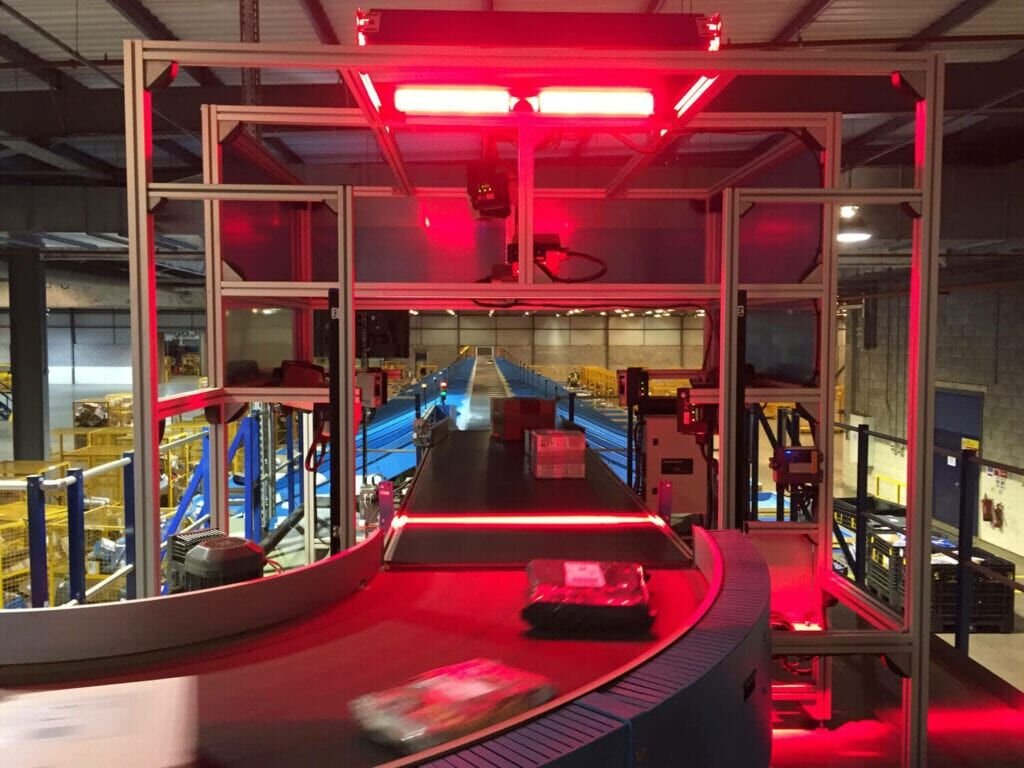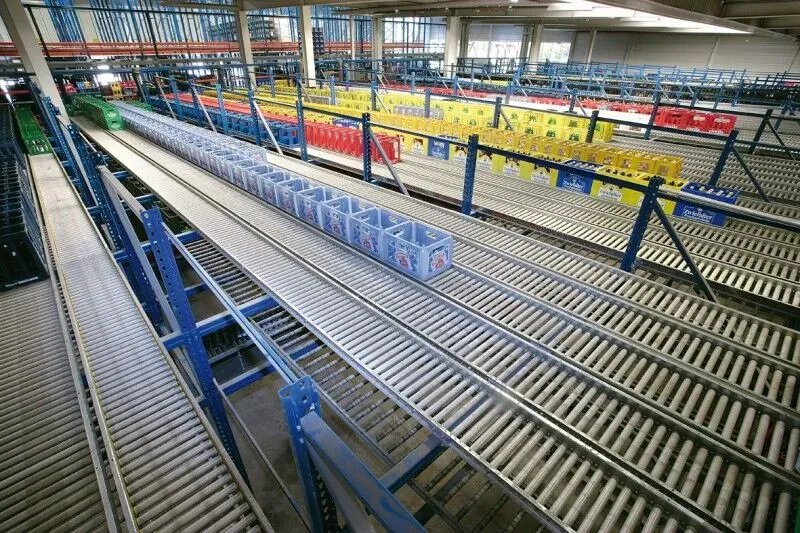Ways in which Pallet Conveyor Systems Enhance Warehouse Operations
Streamlined Material Handling
Intelligent pallet conveying systems are designed to streamline material handling processes within the warehouse. Traditional methods of moving pallets, such as forklifts and manual labour, are prone to inefficiencies, errors, and safety risks. On the other hand, intelligent conveying systems employ advanced automation and robotics, allowing for the seamless movement of pallets from one location to another.
These systems utilise sophisticated sensors, control algorithms, and computer vision to navigate through the warehouse, reducing the chances of collisions and minimising the need for human intervention.
Optimal Space Utilisation
Warehouse space is an asset, and its efficient utilisation is crucial for cost-effective operations. These conveying systems play a vital role in maximising space utilisation within a warehouse.
By automating the movement of pallets, these systems can optimise the layout and arrangement of products, ensuring efficient storage and retrieval. These intelligent routing algorithms can identify the most space-efficient paths and utilise vertical space effectively, allowing for higher-density storage and increased capacity.
Enhanced Accuracy and Traceability
Accurate inventory management is vital for a well-functioning warehouse. Pallet conveyors contribute to enhanced accuracy and traceability, minimising errors and inventory discrepancies. Equipped with barcode scanners, RFID technology, or other identification mechanisms, these systems can track each pallet’s movement, location, and contents throughout the warehouse.
This real-time data integration ensures accurate inventory records, reduces stockouts, and enhances order fulfilment accuracy. Moreover, in the case of recalls or quality control issues, the traceability provided by intelligent conveying systems allows for swift identification and removal of affected products.
Increased Throughput and Productivity
Efficient pallet conveying systems directly impacts the overall throughput and productivity of a warehouse. They enable a continuous and uninterrupted flow of pallets, eliminating bottlenecks and optimising materials handling. By automating repetitive and time-consuming tasks, such as end-of-line palletising, pallet strapping, storage and put away, and pallet movement between picking stations and storage areas, these systems allow employees to focus on value-added activities, such as order picking and quality control. The increased throughput and productivity result in faster order processing, reduced lead times, and improved customer satisfaction.
Safety and Workforce Optimisation
Warehouse operations involve inherent safety risks, particularly when heavy machinery and manual labour are involved. Intelligent pallet conveying systems significantly enhance safety within the warehouse environment. By reducing the reliance on forklifts and manual handling, these systems minimise the chances of accidents and injuries. Additionally, integrating safety features, such as collision avoidance sensors and emergency stop mechanisms, ensures a secure working environment. The reduced physical strain on workers and the elimination of repetitive tasks contribute to a safer workplace and can help alleviate labour shortages by optimising the workforce.
Applications of Pallet Conveyor Systems
Staging
Staging involves temporarily storing pallets in designated areas within the warehouse before they are further processed or shipped. Pallet conveyor systems can efficiently transport pallets to the staging area based on predefined rules or priorities. This ensures that suitable pallets are available at the right time for subsequent operations, such as order picking or loading onto trucks.
Buffering
Buffering refers to temporarily storing pallets in a queue or buffer zone to balance the flow of materials between different stages of the warehouse process. These conveying systems can automatically move pallets to buffer zones to prevent bottlenecks and optimise workflow. This allows smoother operations and avoids interruptions in the production or order fulfilment processes.
Pallet Transport and Distribution
Pallet conveying systems excel in transporting and distributing pallets throughout the warehouse. They can efficiently move pallets between different workstations, storage areas, or production lines, ensuring a continuous flow of materials. This reduces manual handling, minimises downtime, and optimises the overall logistics within the warehouse.
Pallet Strapping
Pallet strapping machines can be integrated with these conveying systems to automate the strapping process. After pallets are loaded with goods, they can be automatically transported to the strapping station. The system positions the pallet correctly, and the strapping machine secures the load with straps or bands. This ensures consistency in pallet strapping and improves load stability during transportation.
End-of-Line Palletising with Robotic Palletiser
At the end of the production line, finished products can be palletised on pallets using a robotic palletising station. Robotic palletiser can stack the products onto pallets in predetermined patterns or configurations. The system coordinates the movement of pallets and interacts with the robotic arm to ensure accurate and efficient palletisation of goods. The palletised goods can be conveyed using palletising systems to transport ready pallets to staging areas or into storage racks and even an ASRS (Automated Storage & Retrieval System) system.
Pallet Profile Checking
Pallet conveyors can incorporate profile-checking solutions to ensure the quality and integrity of pallets. Sensors and cameras can be used to inspect pallets for any damage, misalignment, or other irregularities. This allows for identifying pallets that may not meet the required standards, preventing potential issues in warehouse operations or during transportation.
In-feed & Out-feed for ASRS (Automatic Storage & Retrieval Systems)
Pallet conveying systems are often integrated with ASRS, which are automated systems for storing and retrieving pallets in high-density storage structures. The conveying system facilitates the smooth in-feed of pallets into the ASRS for storage and the out-feed of pallets for order fulfilment or further processing. This seamless integration optimises the utilisation of the ASRS and improves overall warehouse efficiency.
Pallet Shuttle Between Stations
These conveyors can shuttle pallets between stations or work areas within the warehouse. This can include transferring pallets from receiving docks to storage areas, moving pallets between production or processing stations, or transporting pallets from picking stations to shipping areas. The system ensures the efficient movement of pallets, reducing manual labour and streamlining operations.
Goods Receiving and Unloading
Intelligent palletising systems can be employed at the receiving dock to unload pallets from incoming trucks or containers. Automated conveyors and robotic systems can efficiently move pallets from the delivery vehicles to designated storage areas, minimising manual labour and expediting the unloading process.
Order Picking and Fulfilment
Pallet conveying systems are instrumental in order picking and fulfilment operations. By automating the movement of pallets to picking stations, workers can focus on efficiently selecting and packaging individual items. The system can direct the pallets to the appropriate location, ensuring a smooth flow and optimising the order fulfilment process.
Cross-Docking Operations
Cross-docking involves transferring incoming shipments directly to outgoing vehicles without intermediate storage. Intelligent conveying systems for pallets facilitate the seamless transfer and routing of pallets between incoming and outgoing docks. This reduces handling time, minimises inventory holding costs, and enables faster order processing and shipment.
Inventory Storage and Retrieval
Pallet conveying systems effectively manage inventory storage and retrieval. They can transport pallets to designated storage locations within the warehouse based on real-time inventory data. When orders are received, the system can retrieve the necessary pallets quickly and accurately, reducing picking errors and improving overall inventory management.
Work-in-Progress (WIP) Handling
For the handling of Work-in-Progress (WIP) materials in manufacturing environments, pallet conveyors are crucial. They can transport pallets carrying partially completed products between different production areas, allowing for seamless workflow and reducing material handling time.
Packing and Shipping
Pallet conveying systems can streamline the packing and consolidation process before shipping. They can transport pallets to packing stations, where workers can consolidate items, apply labels, and secure the load for transportation. The system ensures efficient flow and minimises errors during the packing and shipping process.
How Can L-A-C Logistics Automation Help?
Intelligent pallet conveyor technology is critical in improving warehouse efficiency through warehouse automation. These systems revolutionise warehouse operations by streamlining material handling, optimising space utilisation, enhancing accuracy and traceability, increasing throughput, and improving safety. The systems’ automation and advanced capabilities allow companies to achieve higher productivity, reduce costs, and deliver superior customer service.
As the demands of the modern business landscape continue to evolve, investing in intelligent pallet conveying technology becomes a strategic imperative for organisations looking to stay ahead in the race for operational excellence. By leveraging smart pallet conveying systems in these various applications, warehouses can achieve higher levels of efficiency, accuracy, and productivity while optimising the utilisation of resources and meeting the evolving demands of the supply chain.
At L-A-C Logistics Automation, we specialise in the design, manufacture and installation of conveyor systems and solutions for a diverse range of industries. Get in touch with us or call us on 0115 975 3300 to discuss further!


